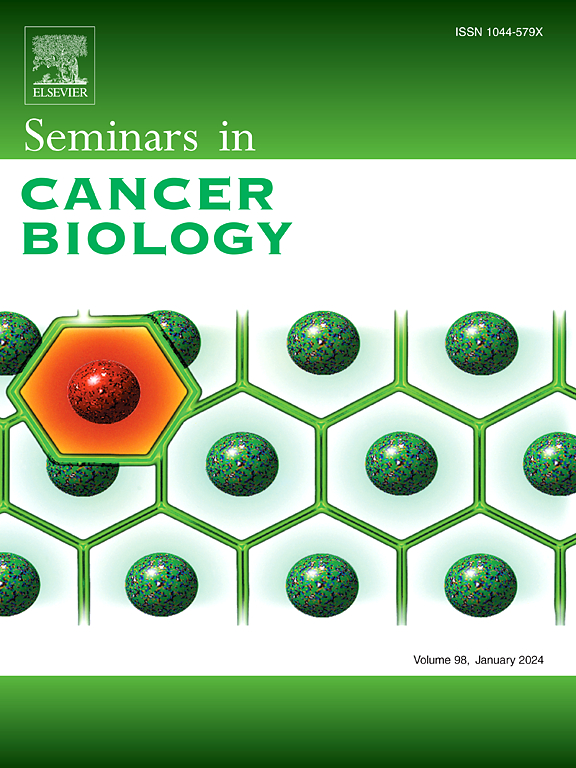Impaired cholesterol and LDL uptake pathways in the development of oncological and cardiovascular diseases
IF 15.7
1区 医学
Q1 ONCOLOGY
引用次数: 0
Abstract
Dietary lipids play a critical role in the development of cardiovascular disease and cancer by influencing key cellular processes. Lipoprotein and fatty acid receptors activate intracellular signaling pathways that promote tumor growth and vascular remodeling. A key event in both cancer and vascular diseases is the retention of low-density lipoproteins (LDL) and other lipoprotein particles by proteoglycans in the extracellular matrix (ECM) of atherosclerotic plaques and the tumor stroma. This retention facilitates lipoprotein modification processes. Dysregulated uptake of modified lipoproteins—particularly through receptors that are not downregulated by intracellular cholesterol levels—leads to excessive lipid accumulation within lipid droplets (LDs) and other intracellular organelles. The lipid and protein content of LDs and mitochondria determine the biophysical and functional characteristics of the crucial interactions between these suborgalles. In particular, lipid-derived mediators such as prostaglandins, leukotrienes, ceramides, oxidized fatty acids, and cholesterol can disrupt LD biogenesis and dynamics, impair mitochondrial function, and alter the expression, activity, and subcellular localization of proteins that regulate LD-mitochondria interactions. Dysfunctional communication between LDs and mitochondria contributes to the onset and progression of cancer and cardiovascular disease by disturbing cellular metabolism and energy homeostasis. Common LDL-related mechanisms in atherosclerosis and cancer have been summarized in Figure 1.
肿瘤和心血管疾病发展中的胆固醇和LDL摄取途径受损
膳食脂类通过影响关键的细胞过程,在心血管疾病和癌症的发展中发挥关键作用。脂蛋白和脂肪酸受体激活细胞内信号通路,促进肿瘤生长和血管重塑。癌症和血管疾病的一个关键事件是低密度脂蛋白(LDL)和其他脂蛋白颗粒被蛋白聚糖滞留在动脉粥样硬化斑块和肿瘤基质的细胞外基质(ECM)中。这种保留有助于脂蛋白修饰过程。对修饰脂蛋白的摄取失调——特别是通过不受细胞内胆固醇水平下调的受体——导致脂滴(ld)和其他细胞内细胞器内过度的脂质积累。ld和线粒体的脂质和蛋白质含量决定了这些亚微粒之间关键相互作用的生物物理和功能特征。特别是,脂质来源的介质,如前列腺素、白三烯、神经酰胺、氧化脂肪酸和胆固醇可以破坏LD的生物发生和动力学,损害线粒体功能,并改变调节LD-线粒体相互作用的蛋白质的表达、活性和亚细胞定位。ld和线粒体之间功能失调的通信通过扰乱细胞代谢和能量稳态,有助于癌症和心血管疾病的发生和进展。
本文章由计算机程序翻译,如有差异,请以英文原文为准。
求助全文
约1分钟内获得全文
求助全文
来源期刊

Seminars in cancer biology
医学-肿瘤学
CiteScore
26.80
自引率
4.10%
发文量
347
审稿时长
15.1 weeks
期刊介绍:
Seminars in Cancer Biology (YSCBI) is a specialized review journal that focuses on the field of molecular oncology. Its primary objective is to keep scientists up-to-date with the latest developments in this field.
The journal adopts a thematic approach, dedicating each issue to an important topic of interest to cancer biologists. These topics cover a range of research areas, including the underlying genetic and molecular causes of cellular transformation and cancer, as well as the molecular basis of potential therapies.
To ensure the highest quality and expertise, every issue is supervised by a guest editor or editors who are internationally recognized experts in the respective field. Each issue features approximately eight to twelve authoritative invited reviews that cover various aspects of the chosen subject area.
The ultimate goal of each issue of YSCBI is to offer a cohesive, easily comprehensible, and engaging overview of the selected topic. The journal strives to provide scientists with a coordinated and lively examination of the latest developments in the field of molecular oncology.
 求助内容:
求助内容: 应助结果提醒方式:
应助结果提醒方式:


